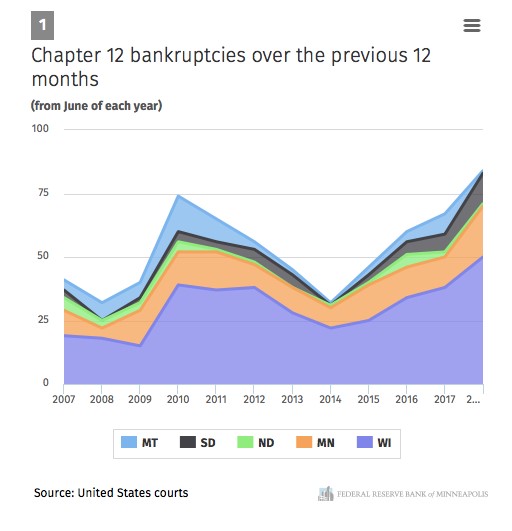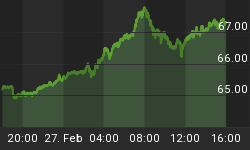A total of 84 farms in the Midwest have filed for chapter 12 bankruptcy protection over the 12 months ending in June, according to a 14 November report from the Minneapolis Federal Reserve--more than twice the level seen in 2014, but fewer than seen in 2010, coming off a global recession.
The problem, says the Minneapolis Fed, is “that nagging economic strain of low commodity prices on farmers and ranchers—compounded for some by recent tariffs”, which is “starting to show up not just in bottom-line profitability, but in simple viability”.

(Click to enlarge)
For now, it’s a curse that’s hitting the Midwest hardest, and Wisconsin is reeling, in particular, accounting for 60 percent bankruptcies in the Ninth District, which includes Minnesota, Montana, North Dakota, South Dakota, and Wisconsin.
While Wisconsin is the second-largest milk producer in the United States, it’s a collection of small dairy farms who haven’t been able to weather big price fluctuations, according to the Fed.
The trend is “both simple and complex”, says the Minneapolis Fed. “For example, current numbers are not unprecedented, even in the recent past, having reached 70 bankruptcies in 2010. However, current price levels and the trajectory of the current trends suggest that this trend has not yet seen a peak.”
Soybeans, too, have become one of the farmers’ biggest bogeymen. Indeed, the worst banking conditions for farmers were in states with the most corn and soybean operations, where farmers are struggling to make loan payments. Related: How President Trump Is Undermining U.S. Oil Producers
The fallout of the trade war has seen soybeans lose one-fifth of their value since April. By mid-October, according to the New York Times, soybean exports to China have dropped 94 percent, from a year earlier.
The government bailout of farmers cost $25 million in September alone—part of Trump’s $12-billion aid package to farmers reeling from Chinese retaliation to American tariffs.
And now, Americans farmers are stuck trying to figure out what to do with all that soybean with the Chinese market effectively closed off by tariffs. Some are storing soybeans hoping for a change in the trade war, but unless that window opens up soon, they won’t be able to pay their bills.
American farmers were in trouble before the trade war, though, but survival now depends on an end to the tariff troubles.
Speaking to the Minneapolis Star Tribune, Citizens State Bank president Mark Miedtke said: “Dairy farmers are having the most problems right now. Grain farmers have had low prices for the past three years but high yields have helped them through. We’re just waiting for a turnaround. We’re waiting for the tariff problem to go away.”
Perhaps no one more than American farmers will be glued to the news on Saturday, when Trump meets with his Chinese counterpart at the G20 in Argentina, where things are about to see a deal to end the trade war—or they’re about to get a lot worse. Saturday and Sunday, in many ways, will determine what happens to all of that soybean; and what happens to America’s farmers.
“We’re just waiting for a turnaround,” one Minnesota banker told the Star Tribune. “We’re waiting for the tariff problem to go away.”
By Charles Benavidez for Safehaven.com
More Top Reads From Oilprice.com:
















